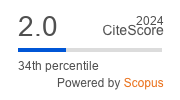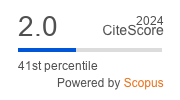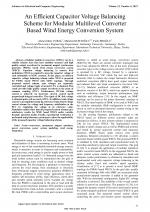| 4/2021 - 4 |
An Efficient Capacitor Voltage Balancing Scheme for Modular Multilevel Converter Based Wind Energy Conversion SystemVURAL, A. M. |
| Extra paper information in |
| Click to see author's profile in |
| Download PDF |
Author keywords
converters, permanent magnet machines, power conversion, power system modeling, wind energy integration
References keywords
energy(29), wind(26), multilevel(17), power(16), modular(14), systems(11), permanent(11), magnet(11), converter(10), synchronous(9)
Blue keywords are present in both the references section and the paper title.
About this article
Date of Publication: 2021-11-30
Volume 21, Issue 4, Year 2021, On page(s): 31 - 42
ISSN: 1582-7445, e-ISSN: 1844-7600
Digital Object Identifier: 10.4316/AECE.2021.04004
Web of Science Accession Number: 000725107100004
SCOPUS ID: 85122267316
Abstract
Modular multilevel converters (MMCs) can be a reliable solution since they have modular structure and high quality output waveform for permanent magnet synchronous generator (PMSG) based wind energy conversion system (WECS). Capacitor voltage balancing in nearest level modulation (NLM) is required to keep the capacitor voltage of each submodule of MMC constant. In this paper, an efficient capacitor voltage balancing scheme under NLM is proposed for PMSG based WECS with MMC topology. Through proposed control scheme, arm voltages are separately controlled and voltage ripple of around 1.5% is obtained. This result provides high quality output waveform at the point of common coupling (PCC). Furthermore, DC-link voltage control is achieved via hysteresis current control based proportional-integral controller. The ripple of DC-link voltage is obtained quite well as nearly 0.25%. In addition, load voltage control is accomplished using dq reference frame-based voltage control scheme for voltage and frequency stabilization at the PCC by regulating the voltage at its reference value. Simulation studies show that all proposed control schemes give satisfactory results for MMC based WECS under variable dynamic operation modes. Finally, experimental verification is performed using laboratory prototype to show the applicability of the proposed capacitor voltage balancing scheme. |
| References | | | Cited By |
Web of Science® Times Cited: 1 [View]
View record in Web of Science® [View]
View Related Records® [View]
Updated 3 weeks, 5 days ago
SCOPUS® Times Cited: 2
View record in SCOPUS® [Free preview]
View citations in SCOPUS® [Free preview]
[1] Design and Experimental Validation Of FPGA Based Digital Control Scheme Of The Nearest Level Modulation Method For Modular Multilevel Converter Topology, Kurtoğlu, Mehmet, Eroğlu, Fatih, Vural, Ahmet Mete, Firat University Journal of Experimental and Computational Engineering, ISSN 2822-2881, Issue 1, Volume 4, 2025.
Digital Object Identifier: 10.62520/fujece.1457671 [CrossRef]
[2] FO-PID Controller for Stability Operation in MMC Based Offshore HVDC Wind Energy System, Ovaiz A, Mohammed, Katta, Pradeep, Joseph, Deepthi, T, Gunasri, A, Umamageshwari, G, Kowsalya, 2023 International Conference on Circuit Power and Computing Technologies (ICCPCT), ISBN 979-8-3503-3324-4, 2023.
Digital Object Identifier: 10.1109/ICCPCT58313.2023.10245289 [CrossRef]
Disclaimer: All information displayed above was retrieved by using remote connections to respective databases. For the best user experience, we update all data by using background processes, and use caches in order to reduce the load on the servers we retrieve the information from. As we have no control on the availability of the database servers and sometimes the Internet connectivity may be affected, we do not guarantee the information is correct or complete. For the most accurate data, please always consult the database sites directly. Some external links require authentication or an institutional subscription.
Web of Science® is a registered trademark of Clarivate Analytics, Scopus® is a registered trademark of Elsevier B.V., other product names, company names, brand names, trademarks and logos are the property of their respective owners.
Faculty of Electrical Engineering and Computer Science
Stefan cel Mare University of Suceava, Romania
All rights reserved: Advances in Electrical and Computer Engineering is a registered trademark of the Stefan cel Mare University of Suceava. No part of this publication may be reproduced, stored in a retrieval system, photocopied, recorded or archived, without the written permission from the Editor. When authors submit their papers for publication, they agree that the copyright for their article be transferred to the Faculty of Electrical Engineering and Computer Science, Stefan cel Mare University of Suceava, Romania, if and only if the articles are accepted for publication. The copyright covers the exclusive rights to reproduce and distribute the article, including reprints and translations.
Permission for other use: The copyright owner's consent does not extend to copying for general distribution, for promotion, for creating new works, or for resale. Specific written permission must be obtained from the Editor for such copying. Direct linking to files hosted on this website is strictly prohibited.
Disclaimer: Whilst every effort is made by the publishers and editorial board to see that no inaccurate or misleading data, opinions or statements appear in this journal, they wish to make it clear that all information and opinions formulated in the articles, as well as linguistic accuracy, are the sole responsibility of the author.



